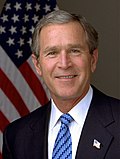Josh Bolten | |
|---|---|
 | |
| 22nd White House Chief of Staff | |
| In office April 14, 2006 –January 20, 2009 | |
| President | George W. Bush |
| Preceded by | Andrew Card |
| Succeeded by | Rahm Emanuel |
| 34th Director of the Office of Management and Budget | |
| In office June 6,2003 –April 14,2006 | |
| President | George W. Bush |
| Deputy | Joel Kaplan |
| Preceded by | Mitch Daniels |
| Succeeded by | Rob Portman |
| White House Deputy Chief of Staff for Policy | |
| In office January 20,2001 –June 6,2003 | |
| President | George W. Bush |
| Preceded by | Maria Echaveste |
| Succeeded by | Harriet Miers |
| Personal details | |
| Born | Joshua Brewster Bolten August 16,1954 |
| Party | Republican |
| Spouse | Ann Kelly (m. 2015) |
| Education | Princeton University (AB) Stanford University (JD) |
Joshua Brewster Bolten (born August 16, 1954) is an American lawyer and politician. Bolten served as the White House chief of staff to U.S. president George W. Bush, replacing Andrew Card on April 14, 2006. [1] Previously, he served as the director of the Office of Management and Budget from 2003 to 2006.
Contents
Since 2017, he has been president and CEO of the Business Roundtable.



